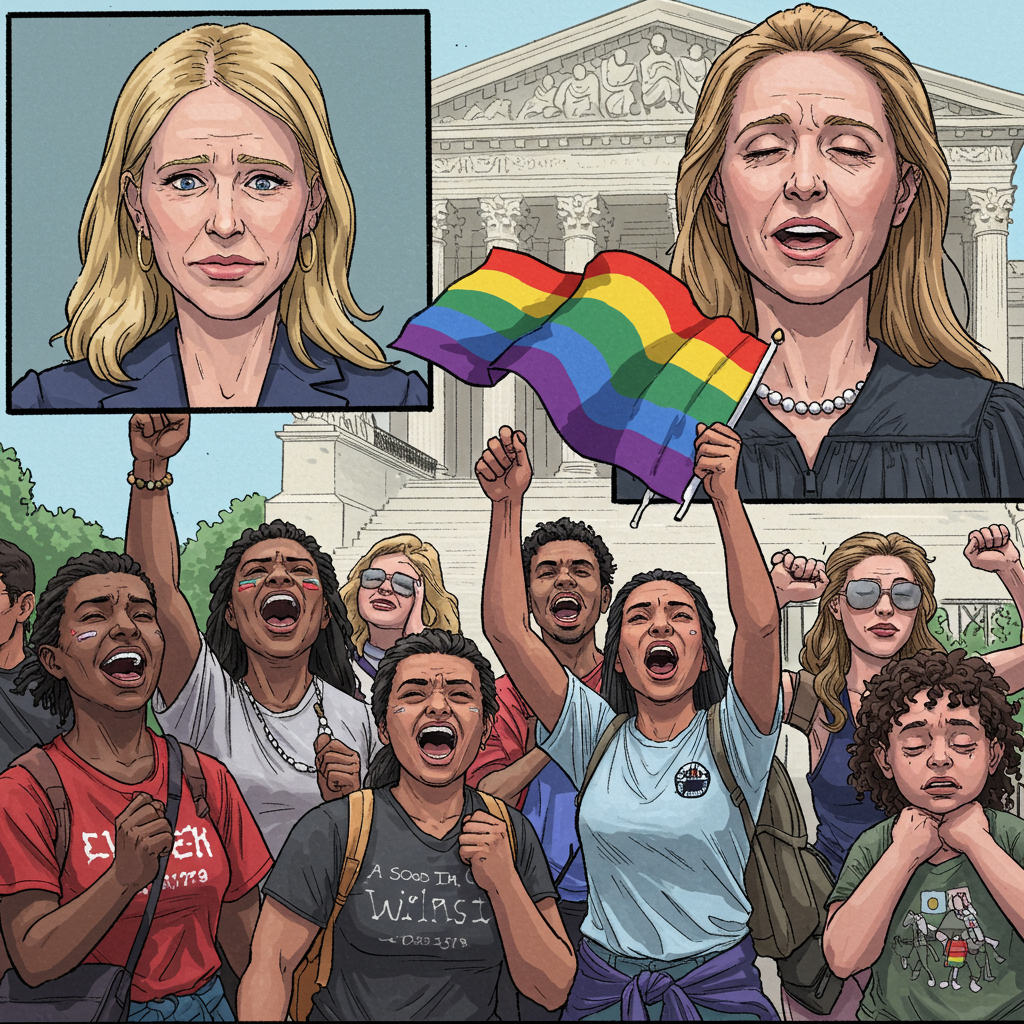The U.S. Supreme Court has made a pivotal decision, opting to uphold the landmark 2015 Obergefell v. Hodges ruling that legalized same-sex marriage nationwide. This significant move provides a moment of relief for millions of LGBTQ+ individuals and their families across the United States. The Court’s refusal to hear an appeal from former Kentucky county clerk Kim Davis effectively maintains the constitutional right to marriage equality, resisting calls to dismantle established protections. This outcome alleviates growing concerns among advocates who feared the conservative-leaning court might revisit this foundational precedent.
Supreme Court Affirms Marriage Equality
On a recent Monday, the nation’s highest court declined to intervene in the case of Davis v. Ermold, sending a clear signal regarding its current stance on same-sex marriage. This decision means Kim Davis will face substantial financial damages and legal fees for her past refusal to issue marriage licenses to same-sex couples in Rowan County, Kentucky. The Court’s action, made without explanation, underscores the principle that public officials are accountable for upholding established law, even when it conflicts with personal religious beliefs. This reaffirmation of the Obergefell decision is a testament to the enduring legal recognition of marriage equality.
Kim Davis’s Challenge: A Deep Dive
Kim Davis gained national attention in 2015. As a county clerk, she openly defied the Obergefell ruling. Citing religious objections, she refused to issue marriage licenses to any couples, same-sex or heterosexual. Her actions led to multiple lawsuits and ultimately resulted in her being jailed for several days on a contempt of court charge. Davis’s appeal to the Supreme Court sought to overturn the lower court rulings against her. Crucially, she also asked the high court to revisit Obergefell v. Hodges itself, arguing that her First Amendment religious protections should shield her from liability. She even characterized the Obergefell decision as “legal fiction.” However, lower courts, including the 6th U.S. Circuit Court of Appeals, had consistently rejected her arguments regarding religious immunity and her liability for damages.
Why the Court Declined: A Technical Perspective
Legal experts widely considered Davis’s Supreme Court appeal a long shot. Many characterized it as a “minor, fact-bound petition” that did not “cleanly present” the fundamental question of revisiting Obergefell. The bulk of her case focused on technical questions related to her legal liability and damages, not directly on the constitutionality of same-sex marriage. Justice Clarence Thomas, who dissented in Obergefell, had previously noted that Davis’s earlier attempts to appeal did not “cleanly present” questions about that decision. This technical assessment likely played a role in the Court’s unanimous decision to deny certiorari, signaling a lack of appetite to reopen the established precedent through this particular vehicle.
A Sigh of Relief for LGBTQ+ Rights
The Supreme Court’s decision brought immediate relief to LGBTQ+ advocates and families. Organizations like the Human Rights Campaign (HRC), GLAD Law, and Lambda Legal celebrated the outcome. For many, the denial of Davis’s appeal was a much-needed affirmation. After the Court’s 2022 decision to overturn Roe v. Wade, anxieties about the stability of other constitutional rights, including same-sex marriage, had intensified. This ruling provides a temporary respite, reassuring couples that their marriages remain legally protected.
Advocates Speak Out
Kelley Robinson, President of the Human Rights Campaign, declared, “Today, love won again.” She emphasized that public officials’ oaths of service extend to everyone, including LGBTQ+ individuals. Robinson highlighted that there are consequences for refusing to respect others’ constitutional rights. Mary Bonauto, the civil rights attorney who successfully argued the Obergefell case, echoed this sentiment. She stated that marriage equality strengthens families, children, communities, and the economy. Bonauto added that “millions of Americans can breathe a sigh of relief for their families, current or hoped for, because all families deserve equal rights under the law.” This collective sentiment underscores the profound personal impact of the Court’s decision.
Public Opinion and Legislative Reinforcement
The Court’s decision aligns with strong public support for same-sex marriage. Polling by the HRC Foundation consistently shows a “super-majority of Americans” are in favor of marriage equality protections. This widespread acceptance provides a supportive backdrop for the Court’s refusal to destabilize the precedent. Furthermore, the Respect for Marriage Act, passed by Congress in 2022, provides an additional layer of federal protection for same-sex marriage. While it does not establish a new constitutional right, it codifies federal recognition for all marriages performed lawfully within any state, offering a legislative backstop against potential future judicial challenges.
The Shifting Sands of the Supreme Court
The current Supreme Court is notably more conservative than the one that decided Obergefell in 2015. Justice Anthony Kennedy, the swing vote and author of the Obergefell majority opinion, retired in 2018. He was replaced by conservative Justice Brett Kavanaugh. Similarly, Justice Ruth Bader Ginsburg, a liberal icon in the Obergefell majority, was succeeded by conservative Justice Amy Coney Barrett. Three current justices – Chief Justice John Roberts and Justices Clarence Thomas and Samuel Alito – were in dissent in Obergefell. This conservative shift had fueled much of the concern among LGBTQ+ advocates about the Court’s willingness to revisit precedents.
The Obergefell Majority vs. Today’s Court
Justice Kennedy’s eloquent Obergefell opinion spoke of the fundamental values of family, love, and liberty. He wrote, “No union is more profound than marriage, for it embodies the highest ideals of love, fidelity, devotion, sacrifice and family.” His words resonated deeply, shaping the legal landscape for same-sex marriage. While the Court’s composition has changed drastically since 2015, the recent decision suggests a hesitance to overturn a deeply ingrained social and legal reality that has impacted nearly 600,000 same-sex couples who have married since the ruling, according to the Williams Institute at the UCLA School of Law.
Stare Decisis and “Reliance Interests”
Despite their conservative leanings, some justices had recently signaled a lack of immediate desire to overturn Obergefell. Justice Amy Coney Barrett noted “very concrete reliance interests” at stake when it comes to same-sex marriage. This legal concept, known as “stare decisis,” refers to the principle of upholding prior judicial decisions. It acknowledges that people plan their lives and make significant choices based on existing laws. Overturning Obergefell would disrupt countless families and legal arrangements. Justice Samuel Alito, while critical of the precedent broadly, also stressed that it was “entitled to the respect afforded by the doctrine of stare decisis.” These statements hinted that the Court was unlikely to casually overturn such a impactful decision without compelling legal reason.
Ongoing Threats and Vigilance
While the Supreme Court’s denial of Kim Davis’s appeal is a significant victory, LGBTQ+ advocates caution against complacency. Mat Staver, head of Liberty Counsel, which represented Davis, reaffirmed his commitment to overturning Obergefell, stating, “It is not a matter of if, but when the Supreme Court will overturn Obergefell.” This sentiment reflects a broader conservative campaign aimed at rolling back same-sex marriage rights and allowing individual states to establish their own marriage policies.
Conservative Opposition Remains Potent
Justice Antonin Scalia, in his vehement Obergefell dissent, blasted the decision as a “threat to American democracy” and a “judicial Putsch.” This enduring ideological opposition means that future challenges to marriage equality are almost inevitable. Lambda Legal CEO Kevin Jennings warned that “our opponents are well-resourced and determined,” highlighting the need for continued advocacy. While this specific appeal is resolved, the broader debate and legal challenges are expected to persist, requiring constant vigilance from supporters of LGBTQ+ rights.
Broader LGBTQ+ Rights Under Scrutiny
Beyond same-sex marriage, concerns persist among LGBTQ+ rights groups regarding other issues, particularly those affecting transgender Americans. In recent months, the high court has addressed cases allowing states to ban puberty blockers and hormone therapy for trans youth, permitting a ban on transgender military service, and allowing US passports to include sex markers consistent with a person’s sex at birth. These decisions illustrate that while marriage equality remains protected for now, other aspects of LGBTQ+ rights, especially for transgender individuals, continue to face significant legal and social challenges.
Impact and Future Outlook
The Supreme Court’s decision solidifies, for the moment, the constitutional right to same-sex marriage in the United States. This refusal to revisit Obergefell v. Hodges provides comfort and security for hundreds of thousands of married same-sex couples and their families. While this specific denial of appeal does not set a formal precedent preventing future challenges, it signals the Court’s current unwillingness to destabilize this widely accepted aspect of American life. The decision reinforces the idea that public officials must serve all citizens equally under the law. However, the ongoing efforts by conservative legal groups mean that the fight for full LGBTQ+ equality is far from over. Vigilance and continued advocacy will be crucial to safeguarding these rights against future legislative and judicial challenges.
Frequently Asked Questions
What did the Supreme Court actually decide regarding same-sex marriage?
The Supreme Court declined to hear an appeal from former Kentucky county clerk Kim Davis. This decision effectively upholds the landmark Obergefell v. Hodges ruling from 2015, which established a constitutional right to same-sex marriage nationwide. By refusing to grant certiorari, the Court avoided revisiting or overturning the precedent, thereby maintaining the legal status of marriage equality in the U.S. This outcome means Davis remains liable for significant damages for her refusal to issue marriage licenses.
What is the significance of the Obergefell v. Hodges ruling today?
The Obergefell v. Hodges ruling, affirmed by the Supreme Court’s recent action, established that the right to marry is guaranteed to same-sex couples by the Fourteenth Amendment to the United States Constitution. This decision legalized same-sex marriage across all 50 states. Today, it remains the foundation of marriage equality, allowing hundreds of thousands of same-sex couples to marry and enjoy the same legal protections and benefits as heterosexual couples. Its continued affirmation is crucial for the stability and recognition of these families.
What does this ruling mean for the future of LGBTQ+ rights in the U.S.?
This specific ruling provides a moment of relief and reassurance, indicating that the constitutional right to same-sex marriage is currently secure. However, it does not eliminate broader threats to LGBTQ+ rights. Conservative legal groups continue to advocate for overturning Obergefell, and other areas, particularly transgender rights, remain under significant scrutiny. While the Respect for Marriage Act offers legislative protection, ongoing vigilance, advocacy, and engagement in both legal and political spheres are essential to defend and advance LGBTQ+ equality in the long term.



